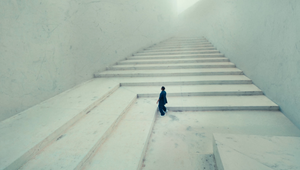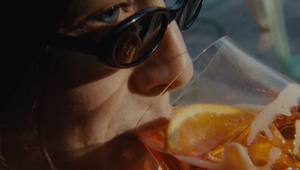
The Directors: King She

Born in India and Poland respectively, Radha Ganti and Robert Lopuski are the husband-wife duo behind King She. Launched in Fall 2022 with their film Rare: The Boy Who Cried Swag, the duo made waves globally with their hyperlink approach to storytelling. The duo first caught the eye with concert visuals for Jay-Z and Kanye. But their desire to share real-life stories led them to Rico Sanches – a Los Angeles model who lost his brother to police violence and subsequent cover-up. The resulting short film highlights both King She’s empathy and technical skill. Shortly after the film’s premiere, King She entered the ad world directing award-winning teasers for Apple Music x Rihanna’s 2023 halftime show. Other brands in their ad work portfolio include commercials for Adidas, Brand Jordan, Spotify and eBay.
Name: King She
Location: Brooklyn, NY
Repped by/in: Henry / France, Somesuch / US+UK, Zauberberg / Germany, and Revolver/ Asia-Pacific
Awards: Since their debut a year ago, King She’s work has won a Cannes Gold & Silver Lion, AICP Best New Director, five AICP nominations, a D&AD nomination for direction, 1.4 gold, Nitehawk Film Festival gold, three Cannes Young Director Awards, and a Ciclope Gold. King She’s short films and music videos have been featured on Nowness, Director’s Library, Vimeo Staff Pick, Promo News, Eyecandy, ITV, Vevo, and more. They were recently named to UK Campaign’s 2023 Top 10 directors list.
LBB> What elements of a script sets one apart from the other and what sort of scripts get you excited to shoot them?
King She> Anything that leaves the door open for conceptual storytelling is really interesting to us. Even if it’s not a fully formed idea, we get excited because then there’s always the possibility to pitch and develop something with the agency. It can be challenging when briefs come to you in that state – because then you’re trying to crack something in a matter of days that people have been working on for months. But it is also the most rewarding if you can come up with something that works. That’s when there’s really an opportunity to infuse a projstect with a fresh approach and make it your own.
Also, when a script comes to us with any kind of opportunity to develop the sonic space in an interesting way, that always catches our attention. We’re very music and sound driven people.
LBB> How do you approach creating a treatment for a spot?
King She> When we speak to agency, we tend to ask them a lot of questions about script on our first call. After that, we dive into research. We start image pulling, thinking about technique and how we want to shoot it.
The hardest part is always the script and cracking the idea. Sometimes we have an inkling of what it should be right away. But usually the process yields where we want to go with it. Some directors have told us they don’t read the script at all at first. That’s a very interesting approach, but at this point for us that’s like trying to fly the plane without an engine.
LBB> If the script is for a brand that you're not familiar with/ don’t have a big affinity with or a market you're new to, how important is it for you to do research and understand that strategic and contextual side of the ad? If it’s important to you, how do you do it?
King She> If we’re pitching for a brand that we’re not familiar with, we always do the research of watching other ads that they have shot. Even if it’s a brand we know well, we revisit all the recent work. It’s really helpful to do that kind of research to gain an understanding of the brand’s style. What they’ve tried visually and conceptually, what’s worked or not worked.
On a practical level, the brand strategy is fully part of the filmmaking process and the decision-making around things like casting, locations, wardrobe. But we try not to get bogged down with data. Our priority as filmmakers is always storytelling first. Getting to the core of it and then telling it in the most filmic way possible.
LBB> For you, what is the most important working relationship for a director to have with another person in making an ad? And why?
King She> We read this quote about filmmaking that is quite true – no one element is most important in making a frame, and everything is 51%. Whether it’s location, casting, lighting, each is 51% most important.
The maths doesn’t make sense at all. But you can say something similar about the working relationships in making an ad.
The producer, the DP, the editor, the agency creatives – even the client -- is 51% the most important relationship in ad-making. Given the specific moment in the process, or the specific issue to problem solve, each person has 51% importance in carrying that ball and making it across the finish line. We always refer to making ads like American football, it’s all about the touchdown.
LBB> What type of work are you most passionate about - is there a particular genre or subject matter or style you are most drawn to?
King She> The best part of being a filmmaker is getting to follow your curiosities. Between the two of us, there is no limit on style or genre. We want to try and do it all. Lately, we’ve been talking a lot about making a horror film.
LBB> What misconception about you or your work do you most often encounter and why is it wrong?
King She> People always seem to think we have more time or budget to shoot our films than we do. We try to be resourceful. And shoot fast.
LBB> Have you ever worked with a cost consultant and if so how have your experiences been?
King She> As far as we know, we have not.
LBB> What’s the craziest problem you’ve come across in the course of a production – and how did you solve it?
King She> There must be something about solving problems that give filmmakers a dopamine rush, because the vast majority of making films is anticipating and dealing with problems.
Probably our craziest problem-solve was figuring out how to create a mythical half goat, half dog creature walking and talking around a town without using any 3D. We only had five biz days from job greenlight to the shoot on that one as well. So it was basically designing this super careful technical shoot while we were running around lit on fire the entire time.
LBB> How do you strike the balance between being open/collaborative with the agency and brand client while also protecting the idea?
King She> Our goal is simply to try and make the same film together with client and agency. It is very time-consuming, because you have to be willing to be involved until the very end to when the film delivers. But so far that has yielded the best results for us.
LBB> What are your thoughts on opening up the production world to a more diverse pool of talent? Are you open to mentoring and apprenticeships on set?
King She> We are a direct result of the industry opening up to more diverse talent. We are very happy the doors have widened. The business is complex to navigate. Talent can get you through the door, but we all need more support than that to survive. Mentoring and apprenticeship is a very practical way to ensure new talent has the support they need. We’re not sure how people are expected to figure it out. But mentorship is one of the main topics and goals of our podcast – The Young Director Award podcast.
LBB> Your work is now presented in so many different formats - to what extent do you keep each in mind while you're working (and, equally, to what degree is it possible to do so)?
King She> It’s actually exciting to us to be honest. It invites different ways to make work. Also it sounds like the :15 sec commercial is becoming it right now. We just did a bunch of :15s for Spotify’s Wrapped campaign. And it was a completely different way of thinking about making an ad.
LBB> What’s your relationship with new technology and, if at all, how do you incorporate future-facing tech into your work (e.g. virtual production, interactive storytelling, AI/data-driven visuals etc)?
King She> We’re into tech. The puzzle of using new visual styles and tools to drive conceptual storytelling is something we enjoy. We’ve experimented with some new stuff most recently in our music video Tanto and our Spotify campaign.















